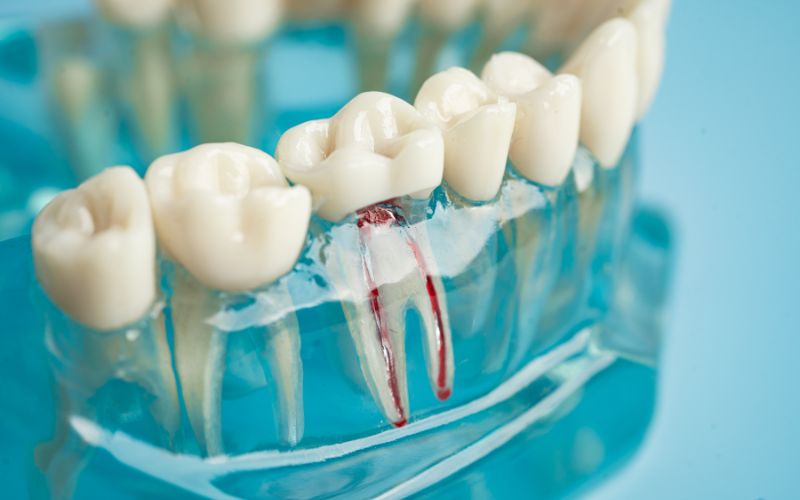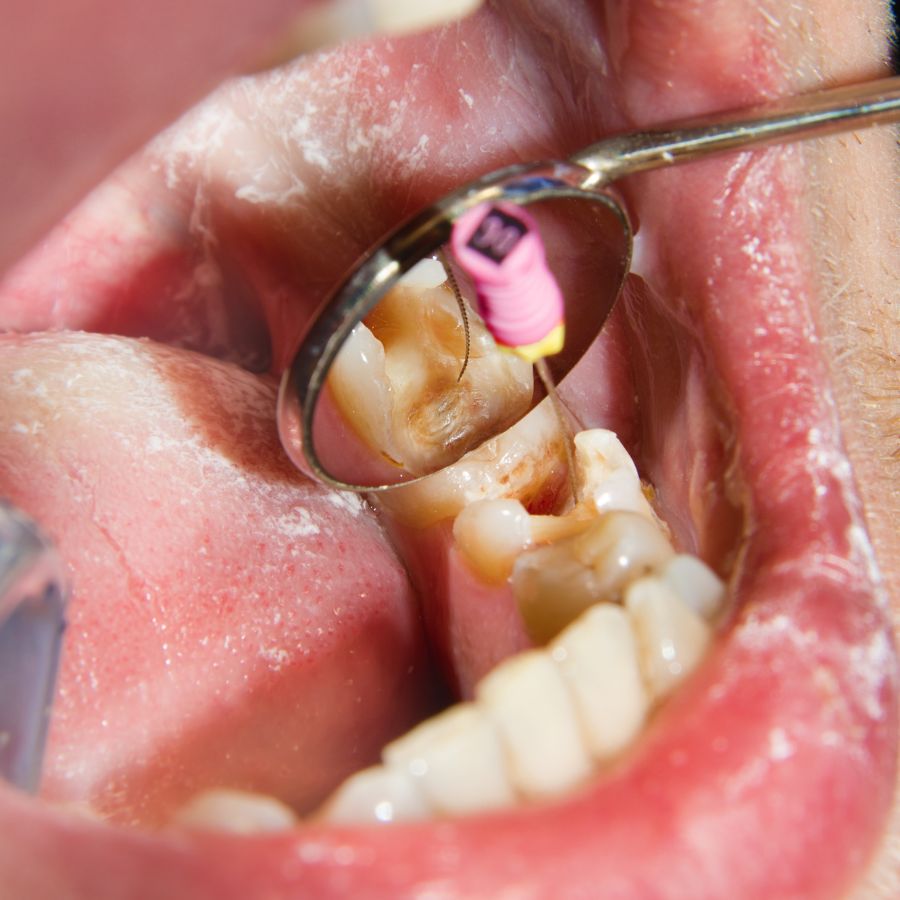



















Root Canal Turkey: Procedure, Cost, Advantages and Reviews
Root canal treatment is an effective solution to save broken or infected teeth. This surgery relieves discomfort while also stopping the infection from spreading by extracting the diseased or injured pulp of the tooth and sealing off the tooth afterward. The cost of a root canal can vary significantly based on factors such as the location of the tooth and the complexity of the procedure. With advanced dental technology available at reasonable costs and trained dentists providing high-quality and cheap root canal treatment services, Turkey has become an attractive dental tourism destination for both domestic and foreign customers. A dental crown is often necessary to support the tooth’s function and appearance after a root canal.

What is Root Canal?
Inside every tooth lies an opening known as the root canal; this is where soft tissues called dental pulp reside. The dental pulp contains critical nerves and blood vessels, allowing the tooth to stay alive; some teeth even have multiple root canals. Root canal operation refers to procedures in which a dentist removes diseased or damaged pulp tissue to prevent tooth loss. Preserving the tooth roots during a root canal procedure is crucial to maintain the stability of the tooth and prevent further complications.
How Much Is Root Canal Treatment?
In the United States, the root canal cost can range between $620 and $1500, depending on the dental office and insurance. Various factors influence root canal costs, including the condition of the tooth and geographical location. However, root canal treatment cost in Turkey are much more affordable; at Teeth Implants Turkey, you can get this treatment for as little as €150. The dental clinic and the degree of complexity of the operation affect the cost. Root canals cost in Turkey generally fall within a lower range due to the competitive pricing of dental services. Additionally, tooth location plays a significant role in determining the cost, with back teeth generally being more expensive to treat than front teeth. Turkey has become a common option for dental treatment as it provides excellent service at a much lower cost than other nations.

The Advantages of Getting Root Canal Treatment Turkey?
- Root canal treatments reduce acute pain from infected or damaged pulp. Eliminating the afflicted tissue will help you to resume a pain-free, regular life.
- This process prevents the premature extraction of your natural teeth. It keeps your smile intact and strengthens the teeth to remain effective. Preserving a natural tooth through root canal treatment is crucial for maintaining both aesthetic and functional aspects of your dental health.
- Eliminating diseased parts helps to stop the pulp infection from spreading to other areas of your mouth or body, avoiding major medical issues.
- Root canal treatments address the underlying tooth disorders, therefore enhancing your general oral health and lowering the chance of future problems.
- After the operation, a dental crown is put on the tooth to improve its look and function. This preserves a good, pleasing smile and helps you become more confident.
Root Canal Treatment Procedure in Turkey: Stages
To guarantee you won’t feel any discomfort throughout the operation, the dentist first numbs the region using a local anesthetic.
The mouth is meticulously cleansed and sterilized to prepare it for root canal dental procedures.
After that, they will create a little hole in the teeth – this is to access the tooth root while trying to preserve as much of your natural teeth as feasible.
The next step is to take out the dental pulp, which contains essential nerves and blood vessels – it must be removed, whether dead or inflamed, so the canals can be properly cleaned.
The dentist will next utilize specialized equipment to clean out the tooth’s root, ensuring that any remaining infected tissue, nerves, or blood vessels are eliminated. They will go over everything carefully to guarantee everything is cleaned away.
After cleaning, the dentist sterilizes the canals once more to ensure no germs remain and cause problems down road.
Lastly, they fill the pulp chamber of the treated tooth with a medicinal biocompatible substance to seal everything and prevent the recurrence of diseases.
When Should You Consider a Root Canal Treatment?
Root canal treatment could become necessary when your teeth experience significant pain or sensitivity when eating hot or cold food items; swelling around the gums or darker-than-usual teeth could indicate internal issues. While discomfort may subside without treatment, that doesn’t always mean there is no problem. Instead, infections could spread and kill off more pulp inside your tooth – it would be wiser to schedule a consultation with a dentist early so they can assess your tooth and advise you whether a dental root canal treatment is suitable for you.
What Are The Signs Of An Injured Or Infected Root Canal?
- An unexpected onset of pain, particularly throughout the night – taking painkillers might not help. Tooth pain can signal the need for immediate treatment to prevent further complications.
- Should your tooth ache when touched, in response to hot or cold temperatures, and last for an extended period of time, this might point to an infection.
- Infection spreading may cause inflammation around the tooth, gums, or outside the mouth. Preserving tooth roots during treatment is crucial to prevent further complications and maintain tooth stability.
- Should your tooth begin to change color, darkening, this might indicate that the infection has damaged the inner tissue.
How Long Does Root Canal Treatment Take In Turkey In Terms Of Sessions?
The state of the tooth determines the number of root canal treatment sessions you might need. Usually, the treatment can be finished in one session if the tooth is still alive and the tooth decay has just reached the pulp. However, The operation could take multiple sessions if the tooth is dead or if an infection at the root tip causes swelling either within or outside the mouth.
Under such circumstances, the dentist puts medicinal substances in the canal to eradicate the germs and waits for the infection to die down. A temporary filling is applied between sessions to enable the tooth to remain functional. Some root canal treatments, especially for more severe infections, may need more than one appointment to eliminate all traces of germs and repair the tooth.
Root Canal Vs Tooth Extraction
Root canal therapy is usually the last resort to save the tooth from extraction. Preserving a natural tooth through root canal treatment is crucial as it addresses infected dental pulp and prevents complications such as abscesses and tooth loss. Even after having undergone this therapy, the infection could resurface five or ten years later and necessitate extraction of that particular tooth.
Although the cost of extracting a tooth is minimal compared to root canal treatment price & root canal crown cost, the true expense comes later. A dental crown serves as a final restoration to support the tooth’s function and appearance after a root canal. To replace the lost tooth, you would most likely require a dental implant or bridge; these can be much more expensive than the root canal procedure. Moreover, they are necessary to enable you to chew properly once more; therefore, skipping this is not really an option.

Start Creating Your Treatment Plan!
You can contact us by filling out the pre-request form.
FAQs
Is Root Canal Procedure Painful?
Modern anesthetics make root canal surgery less uncomfortable. Before starting, your dentist numbs the area to reduce any sensation throughout the procedure. You might feel soreness afterward, although any discomfort should usually be manageable with over-the-counter pain relievers. Overall, it will likely be much less uncomfortable than the root infection itself!
What Are the Risks of Leaving an Infected Root Canal Untreated?
Untreated infected root canals could result in serious consequences, including tooth abscesses with pus accumulation in their surrounding region and deeper tissues becoming infected, potentially impacting jawbone integrity and adjacent soft tissues. In extreme cases, the infection may even spread beyond the jawbone to neck tissue, leading to sepsis (a life-threatening disorder caused by infection entering the bloodstream) with fatal consequences; early treatment helps mitigate such major hazards.
How Long Does a Root Canal Treatment Turkey Take?
Usually, a root canal treatment in Turkey lasts one hour per session. However, the whole process of restoring the tooth could take anywhere from one to three sessions spread over days up to a week, depending on how complicated the situation is.


